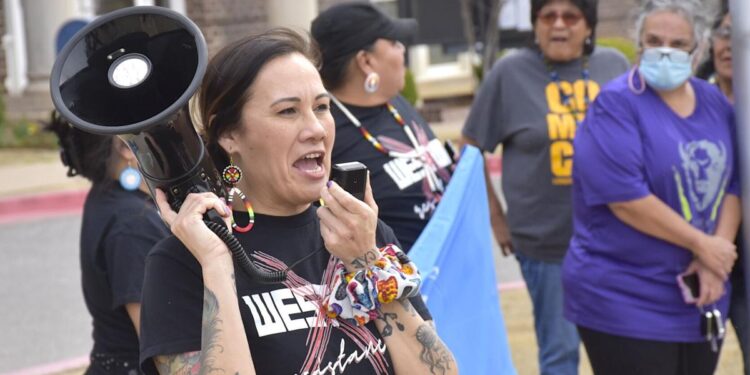(This is the fourth of the five biggest stories of 2024 as determined by The Constitution staff. More stories will follow each edition through Jan. 1.)
One of the city’s largest economic development projects is moving forward — after criticism that erupted into protests and pointed exchanges with city officials earlier this year.
Economic development entities and City of Lawton officials had been negotiating with Westwin Elements for the better part of a year before publicly naming the entity they would be providing development incentives to in exchange for a plant. Westwin said it would build a pilot plant for refining cobalt (later changed to cobalt/nickel) as the forerunner of a full-scale, $732.5 million refinery that would employ more than 700 people when it became fully operational (a final decision on building that plant in Lawton has not been announced publicly). While most criticism has quieted, it was vocal for months.
Concerns started with those closest to the plant site at Southwest 112th Street and Bishop Road, but quickly expanded to others in the area, region and state, and to Native Americans inside and outside Oklahoma who said they wanted a voice in a potentially hazardous refinery being placed close to historic tribal lands and landmarks. Many concerns centered around health and safety: worries the plant was processing a substance that could be dangerous when humans, animals and the environment were exposed; and worries whether the plant had enough safety protocols to outweigh dangers.
Westwin sought to alleviate concerns with town hall meetings with the community in general (officials also met multiple times with residents who lived near the site) and specific local entities, answering questions about what the project was and wasn’t.
The first public meeting was in October 2023, where many questions centered on the actual process. Westwin employee explained the refining process and multi-layer safety protocols that have been successful in plants in other parts of the world. Westwin Chief Operating Officer John Shelegey said “incredibly stringent” safety systems — inside and outside the plant — would be included in the facility so contamination would not be an issue.
A second town hall in December 2023 continued to focus on residential concerns, specifically about safety controls within the plant and the danger of contamination outside. Officials wanted the new public meeting to help address concerns of residents who were circulating a petition asking local entities to back away from the project because of the risks.
Resident John Fedrick, who has a background in chemistry, said after one meeting that Westwin had not addressed all his concerns, adding officials had cherry picked the questions on which they chose to elaborate.
“So, my concerns come from the environmental perspective and are some of the questions I want addressed,” he said, adding he didn’t believe Westwin officials wanted to answer them.
Like Fedrick, Becky Lekey was concerned about the byproduct nickel oxide, which is toxic when inhaled. Lekey, who took her concerns to the City Council and Comanche County Board of Commissioners, said environmental issues had not been addressed, and she wanted additional details about Department of Environmental Quality oversight.
Opposition spread to City Council meetings, where members of the group Westwin Resistance continued to ask questions, criticize city officials for supporting the project and oppose the idea of a refinery. In February, some members began chanting “shut it down” during the public comment portion of the council meeting, and one woman was escorted from the auditorium by police.
Some of those same people had staged a protest in front of Lawton City Hall before the council meeting, as part of a rally that outlined Native American opposition. Ashley LaMont, national campaign director of Honor the Earth, said tribal members and others remained firmly opposed to the Westwin project.
“No means no,” she said, adding that when Kiowa, Comanche and Apache leaders met with Westwin CEO KaLeigh Long and told her they opposed the project, Long told them she was going to building the plant anyway.
LaMont said Westwin Resistance wanted city leaders to obtain permission from the KCA before construction on the pilot plant was allowed, something economic development experts said wasn’t necessary because the land being dedicated to the plant had been purchased from private owners who had owned the tract for decades.
Members of the Comanche Business Committee were especially vocal, approving a resolution in February saying they opposed the project because of health concerns and because of the plant’s proximity to the historic Deyo Mission Cemetery (the Kiowa Tribe also approved a resolution opposing the plant). The Comanche Business Committee’s opposition came after former Comanche Chairman Mark Woommavovah withdrew his support after publicly supporting the effort because of its economic development potential. The business committee censured Woommavovah in March for his endorsement.
Opponents continued to attend City Council meetings for several months, speaking during the public comment periods. But, some of that opposition was quieted as council members began putting protocols into place to control what they said was behavior that was getting out of control.
Want to reach a local audience and grow your business?
Our website is the perfect platform to connect with engaged readers in your local area.
Whether you're looking for banner ads, sponsored content, or custom promotions, we can tailor a package to meet your needs.
Contact us today to learn more about advertising opportunities!
CONTACT US NOW





